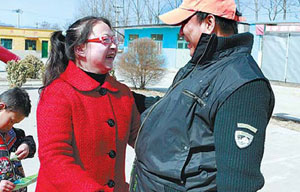'Spring' in the air for NGOs?
Updated: 2013-04-17 13:26
By Tang Yue and He Dan in Beijing (China Daily)
|
||||||||
An unfamiliar concept
The NGO concept was largely unknown in China until the fourth World Conference on Women was held in Beijing in 1995 and a forum for NGOs was included, Xie said. "It was the first time that I and many other participants had heard the phrase," she recalled.
In the 18 years since, NGOs and the public have started to play an increasingly important role in providing social services and advocating changes in public policy, acting on the example set by NGOs in the wake of the 2008 Sichuan earthquake. But for many Chinese, NGOs are still an unfamiliar concept.
"I once went to the local tax bureau to do business and the staff were totally unaware of NGOs. And that was in 2011," said Wang Weina, director of Beijing NPI, a support organization for grassroots NGOs and newly founded public organizations.
In addition to the registration reform, the government should also help to incubate and foster grassroots NGOs, she said. "Some organizations are able to provide good services, but they don't even know how to write a project proposal."
Tsinghua's Wang Ming, who is also a delegate to the Chinese People's Political Consultative Conference, said many of his colleagues on China's top advisory body know little about NGOs. Some asked him to explain the concept to them when the reform plan was announced.
On a positive note, funding from local foundations is increasing and the outsourcing of social services to NGOs has become increasingly popular among local governments, because they realize the practice is more economical and efficient. In Beijing alone, 363 programs were outsourced in 2011, resulting in NGOs collecting 53 million yuan ($8.6 million) in fees.
"The reform could be a breakthrough (for NGO development)," said Liu Peifeng, a legal expert at Beijing Normal University who specializes in the study of nonprofit organizations.
He said the government should not only allocate funds, but also make social organizations, businesses and individuals the main providers of public services. "Otherwise, it is more of a policy proclamation. The real impact of the policy remains to be seen."
|
|
|
| Fresh Bread, fresh start |

 'Taken 2' grabs movie box office crown
'Taken 2' grabs movie box office crown
 Rihanna's 'Diamonds' tops UK pop chart
Rihanna's 'Diamonds' tops UK pop chart
 Fans get look at vintage Rolling Stones
Fans get look at vintage Rolling Stones
 Celebrities attend Power of Women event
Celebrities attend Power of Women event
 Ang Lee breaks 'every rule' to make unlikely new Life of Pi film
Ang Lee breaks 'every rule' to make unlikely new Life of Pi film
 Rihanna almost thrown out of nightclub
Rihanna almost thrown out of nightclub
 'Dark Knight' wins weekend box office
'Dark Knight' wins weekend box office
 'Total Recall' stars gather in Beverly Hills
'Total Recall' stars gather in Beverly Hills
Most Viewed
Editor's Picks

|

|

|

|

|

|
Today's Top News
Boston bombing suspect reported cornered on boat
7.0-magnitude quake hits Sichuan
Cross-talk artist helps to spread the word
'Green' awareness levels drop in Beijing
Palace Museum spruces up
First couple on Time's list of most influential
H7N9 flu transmission studied
Trading channels 'need to broaden'
US Weekly

|

|









